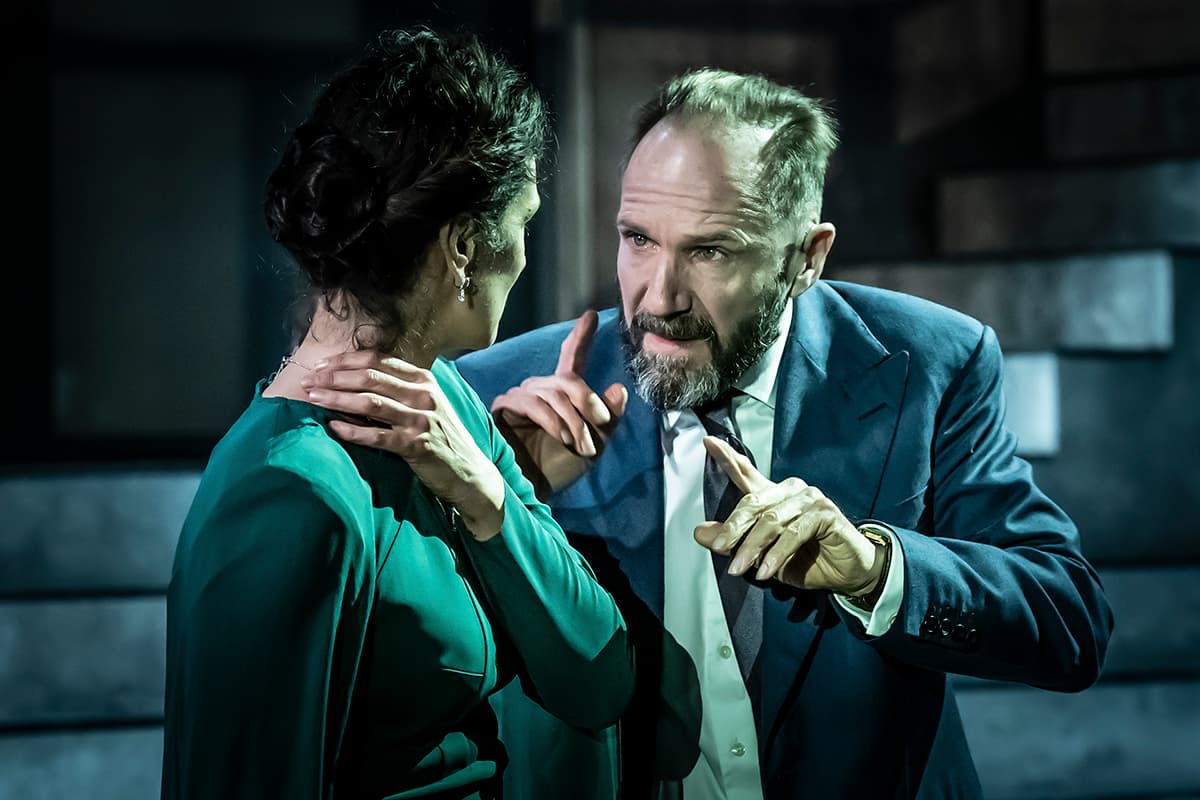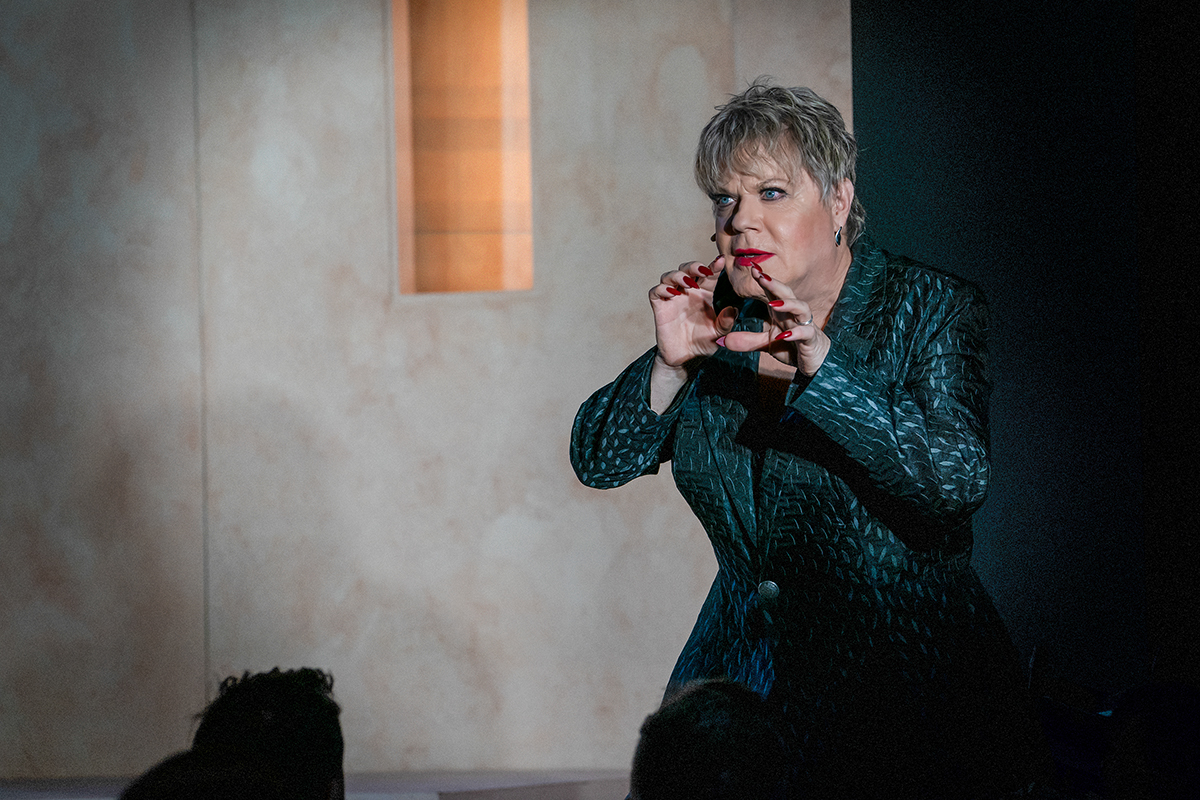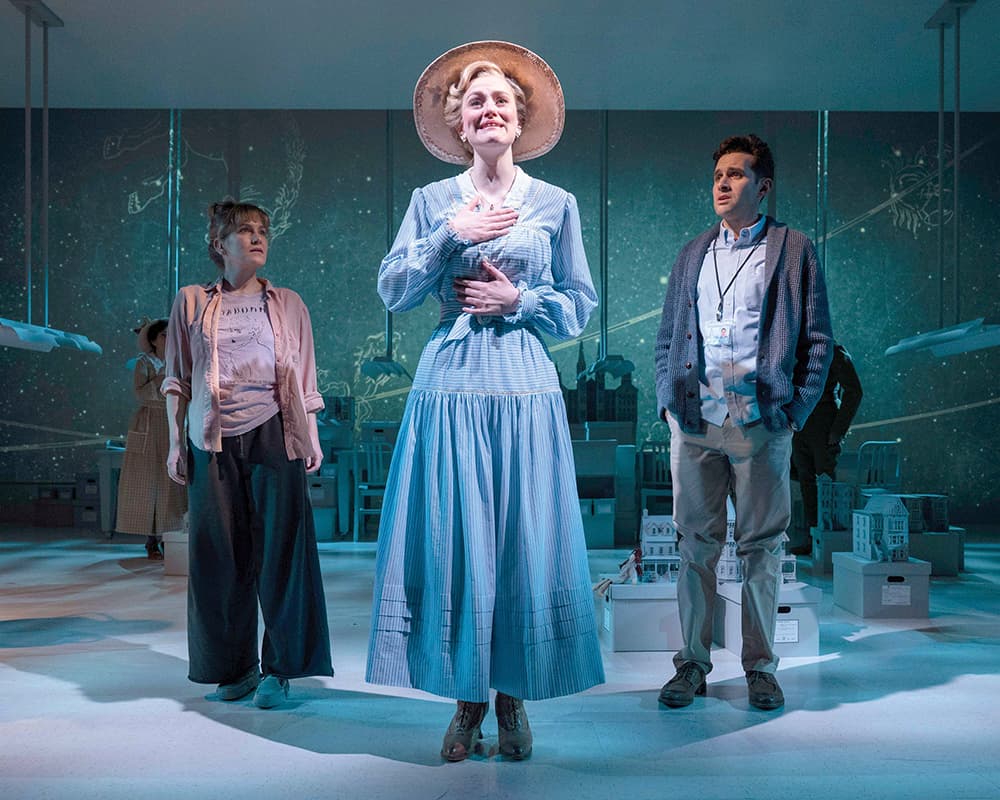Review: Folger Shakespeare Theatre’s “Julius Caesar”
Folger's production of the Bard classic is meticulous, captivating, and a fitting tale to retell in Washington

Halloween has come and gone, but specters still haunt the stage at Folger Theatre — ghosts of those lost to war, which will also stick around well past Veteran’s Day. These cloaked souls lurk in the shadows and stalk the set, like a group of grim reapers, in Robert Richmond’s stunning, mystical production of Julius Caesar. They faintly chant what must be warnings of further bloodshed to come, if we could only make them out. But just as Caesar ignores his Soothsayer’s fervent plea “Beware the Ides of March,” so the lost souls’ incantations fall on deaf ears.
In a press release, Janet Griffin, the artistic director of Folger Theatre, calls Julius Caesar “the ideal play to perform just steps away from the nation’s capitol.” Not that she means to suggest that it will or even should have a perpetual run — making it Folger’s equivalent of the Kennedy Center’s Shear Madness — but if one were to consider the notion, Richmond’s production is a worthy contender. As with his last production at Folger, the unprecedented in-the-round staging of Richard III last spring, Richmond has once again created a show that captivates and entertains even those with only limited knowledge — or interest — in this play or the Bard in general.
Of course, most people have at least limited knowledge of Julius Caesar, whether from faded memories of reading the play in high school or even the many quotes and sayings that emanate from it. (“Et tu Brute,” “Lend me your ears,” “We should totally just stab Caesar!” to name a few.) And certainly it’s a fitting tale to retell in Washington, a town overrun with people of out-sized ambition, as well as the trigger-happy types ready to do almost whatever it takes to knock them down.
Michael Sharon is a charming, dramatic presence as Caesar, playing him with a cocky, flamboyant air almost as if he were a male diva. Until he’s stabbed to death by a group of confidantes cum conspirators. When we see him again it’s as a glowering, towering apparition, menacing Brutus. Anthony Cochrane plays Brutus as an even-keeled everyman, which makes him seem more likeable, but also less worthy of the throne. Richmond has done an admirable job selecting his cast, which is also notable for its diversity. Both Caesar and Brutus are married to women played by African-American actresses, the poised Deidra LaWan Starnes and the entrancing Shirine Babb, respectively.
Maurice Jones acts as a politician’s politician, dominating the stage in his scenes as Caesar’s closest ally Mark Antony. Jones has the audience in his hands while delivering his character’s famously fiery oratory at Caesar’s funeral. It’s equally hard to take your eyes off Maboud Ebrahimzadeh in his role as the weasly, duplicitous Casca, or Robbie Gay as Trebonius. Though, of course, most of the time he’s on stage, Louis Butelli is the one to beat. It’s hard to imagine a more commanding, conniving Cassius, the man who conceived of the plot to kill Caesar — in Butelli’s portrayal of the man as predator, you couldn’t love hating him more.
For this production, Richmond was partly inspired by a visit to Arlington Cemetery, and you can sense that in Tony Cisek’s appropriately grim set. Big stone blocks are stacked and fanned out to create a curved staircase, which also doubles as a back wall for a Roman forum and a memorial for Caesar, complete with an eternal flame. Beyond the great set, Richmond once again smartly employs lighting designer Jim Hunter and sound designer Eric Shimelonis to conjure the right shadowy, foggy, ominous sense of place. Even more impressive is the way Richmond, working with fight director Casey Dean Kaleba, has his actors move — from the lurching lost souls to the multiple slow-motion battle scenes to the marches and synchronized hand gestures showing group solidarity. Everything here is stylized in an evocative, even elegant manner, with every detail carefully thought out, right down to the poppy petals that are regularly tossed out after each death.
After all, since the First World War red poppies have been a symbol of remembering the war dead.
Julius Caesar (![]()
![]()
![]()
![]() – 1/2) runs to Dec. 7 at Folger Shakespeare Theatre, 201 East Capitol St. SE. Tickets are $40 to $75. Call 202-544-7077 or visit folger.edu.
– 1/2) runs to Dec. 7 at Folger Shakespeare Theatre, 201 East Capitol St. SE. Tickets are $40 to $75. Call 202-544-7077 or visit folger.edu.
[goldstar-plugin teritory=8]
Support Metro Weekly’s Journalism
These are challenging times for news organizations. And yet it’s crucial we stay active and provide vital resources and information to both our local readers and the world. So won’t you please take a moment and consider supporting Metro Weekly with a membership? For as little as $5 a month, you can help ensure Metro Weekly magazine and MetroWeekly.com remain free, viable resources as we provide the best, most diverse, culturally-resonant LGBTQ coverage in both the D.C. region and around the world. Memberships come with exclusive perks and discounts, your own personal digital delivery of each week’s magazine (and an archive), access to our Member's Lounge when it launches this fall, and exclusive members-only items like Metro Weekly Membership Mugs and Tote Bags! Check out all our membership levels here and please join us today!
























